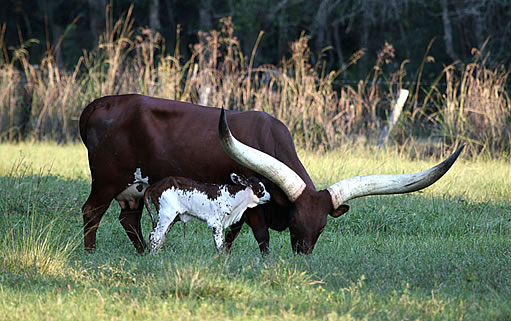 |
Mabarei kuinetab teta moitanyi. (Nandi) Pembe ya ng’ombe haiui ndama wake. (Swahili) La corne d’une vache ne tue pas son veau. (French) A cow’s horn does not kill its calf. (English) |
Nandi (Kenya) Proverb
Background, Meaning and Everyday Use of the Proverb
The Nandi are part of the Kalenjin ethnic group, which include eight culturally and linguistically related groups, namely the Kipsigis, theTugen, the Marakwet, the Pokot, the Keiyo, the Sabaot, and the Terik. They lived and still form the majority in the highland areas of Nandi Hills in the former Rift Valley Province of Kenya. The Nandi primarily inhabit the high plateaus which have good agricultural potential.
Oral tradition was and still is very important among the Nandi. Prior to the advent of written literature, folktales served to convey a sense of cultural history. The Nandi have four oral traditions: stories, songs, proverbs, and riddles. Stories are usually about both people and animals, and certain animals are thought to have particular character traits that bear similarities with those of people. For example, the hare is a trickster figure whose cleverness can get him in trouble, the lion is courageous and wise, and the hyena is greedy and destructive. Songs accompany work and play, as well as ceremonial occasions such as births, initiations, and weddings. Riddles involve word play and are especially popular with children. Proverbs convey important messages and are often used when elders settle disputes or advise the youth.
Infants are treated indulgently, but strict obedience (enforced by corporal punishment) is expected from children by about the age of six. The proverb A cow’s horn does not kill its calf was used to emphasize the importance of disciplining children and punishing them for wrongdoing to ensure that they grow up as upright and useful members of the society.
Biblical Parallels
Hebrews 12: 6 (NLT).
“For the LORD disciplines those He loves, and He punishes each one he accepts as his child.”
Proverbs 23:13-14 ESV
“Do not withhold discipline from a child; if you strike him with a rod, he will not die. If you strike him with the rod, you will save his soul from hell.”
Contemporary Use and Religious Application
Just like a cow’s horn cannot kill its calf, punishing a child will not kill them but will make them grow up as disciplined and upright members of society. Through punishment and discipline, a parent can save their children from harm that may befall them later in life. In the same way, God can punish those He loves to correct them in case their actions are not pleasing to Him. A classic case of ‘tough love’.
Bcz Mabuto (Ed.)
Joseph Kai Kariuki
Cell Phone: +254700446884
Email: josephkaikariuki@gmail.com.
Photographs provided by:
Cephas Yao Agbemenu
Department of Fine Arts
Kenyatta University
P.O. Box 43844
Nairobi, Kenya
Cellphone: +254 723-307992
Email: cyagbemenu@yahoo.com

